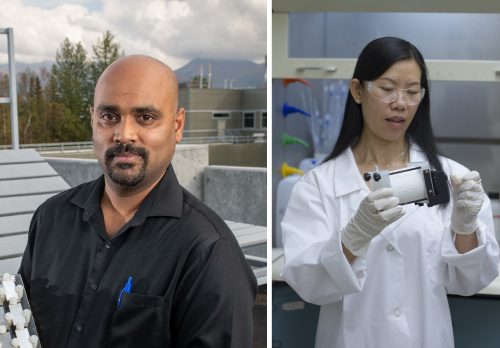UAA and UAF researchers awarded NASA EPSCoR Research award
July 30, 2020

Two University of Alaska researchers have received a NASA EPSCoR Research award.
The Alaska NASA EPSCoR Program announced the selection of a collaborative project between Raghu Srinivasan (science principal investigator), from the College of Engineering at UAA, and Lei Zhang (co-investigator) from the College of Engineering and Mines at UAF. The pair will be exploring the corrosion impacts of cold climates. Their project, "Development of Test Sites and Atmospheric Corrosion Studies of Metal Alloys and Coatings Exposed to Cold Arctic/Sub-Arctic Climate," was selected to be funded at $750,000 over a three year period.
It is commonly assumed that there is very little to no corrosion in cold environments. However, previous studies in the Antarctic and Arctic regions have shown significant corrosion damage when exposed to cold conditions. Atmospheric corrosion occurs when a metal surface is under a thin layer of moisture, but not completely immersed, and the metal surface corrodes while exposed to environmental factors.
With the recent climate change in the Arctic and sub-Arctic region, there is a renewed interest to study the atmospheric corrosion mechanisms. The combination of urbanization and proximity to marine and volcanic environments make Arctic and sub-Arctic regions in North America, particularly Alaska, an important natural laboratory to study atmospheric corrosion in cold regions.
Corrosion continues to be a major problem of NASA, and it is included in NASA’s Space Technology Roadmap to reduce the cost and improve the sustainability and efficiency of its ground operations in support of future launch activities.
For more information, email Kayde Kaiser at kekaiser@alaska.edu.
NASA’s announcement on the 2020 CAN awards


